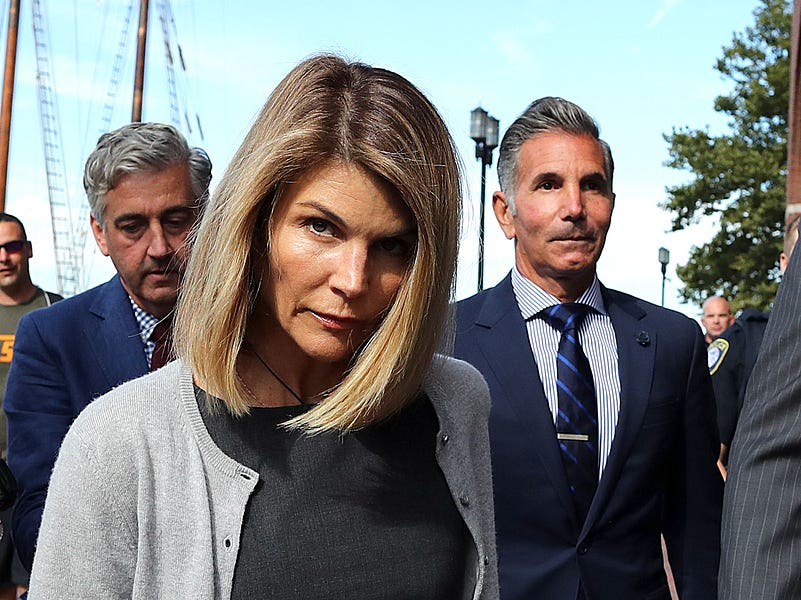Federal prosecutors in the United States get to pick their spots. The vast majority of criminal conduct (think theft, burglary, assault, sex crimes) is prosecuted on the state and local level, and most federal crimes, from drug possession and distribution to various forms of fraud, are also violations of analogous state laws. So unless a uniquely federal crime is involved (such as immigration, terrorism, espionage, or crimes against federal officers or property), the feds almost never have to take a case, lest it go unpunished.
This is why being a federal prosecutor is such a great job, but also why getting prosecuted by the feds usually takes some doing. Sure, that check-kiting scheme, marijuana distribution conspiracy, or even insurance fraud grift you have going are all technically prosecutable by Team America, but federal law enforcement generally feels it has more important things to do. Unless your scheme involves either very big money, large amounts of illegal drugs, or there is another good reason to pique the feds’ interest, your local prosecutor is your biggest worry.
This is why Bernie Madoff faced federal prosecution for various flavors of fraud owing to the massive dollar amounts he bilked his clients out of, but if you call your local federales and present rock-solid evidence that you were taken for a few grand by a rogue contractor who falsified his invoices and sent them to you via the U.S. mail (mail fraud) after calling you (wire fraud) to falsely assure you that your new deck was made of pressure-treated lumber when it wasn’t, a federal prosecutor would likely never take the case.
So why is it that Lori Loughlin (Aunt Becky!), Felicity Huffman, a managing partner of a major New York law firm, and a veritable conga line of comically privileged helicopter parents from Los Angeles, New York, and elsewhere descended on the Moakley Federal Courthouse in Boston to plead guilty to federal charges for illegally scheming their children into college? Moreover, how is it that almost all of these parents have been or will be serving at least a few weeks or months in federal prison for a scheme that seems at times as much comic as tragic? From afar, “rich family buys kids’ way into college” seems like the ultimate “dog bites man” headline.
Unacceptable: Privilege, Deceit & the Making of the College Admissions Scandal, by Wall Street Journal reporters Melissa Korn and Jennifer Levitz provides insight and behind the scenes details about the FBI operation code-named “Varsity Blues” and the eventual federal prosecution of a creatively corrupt private college admissions consultant, several compromised college coaches, and scores of morally vacant parents for whom the risk of a child attending the likes of Arizona State University was more frightening than the risk of a federal felony beef.
The book is successful in telling the tale of Varsity Blues on multiple levels. On one level, it functions like People magazine with better sources as it describes some of the rich and famous families involved in juicy detail: the morning when they were arrested and some recognized each other in a holding cell, their thought processes that led them to cheat to “help” their (often unaware, which was heartbreaking) children; their rationalizations and cluelessness after the fact; and often their jarring sense of entitlement. After what some parents, a shocking number of whom go on the record with the authors or at least cooperated, fed the authors (presumably through high-priced public relations professionals), I am convinced my greyhound and his one “woof” vocabulary could do a better job humanizing some of these parents (one dad literally asked the judge for a “Mexican vacation” exception to the court order to stay in the country pretrial).
On another level, the book reads like straight “true crime.” The psychological examination and backstory of Rick Singer, the consultant who was the core of the scheme and who appears to have been driven as much by “winning” as by money, is fascinating. The dumb-luck origin and ever expanding scope of the investigation from the government side is fast-paced and interesting (although you can always tell the unnamed government sources by seeing who is written about the most flatteringly).
But where the authors really shine is in describing the field of college admissions that all of these crooked players exploited—the gluttonous, unseemly drive for money at prestigious universities (USC, I’m looking at you), the degree to which “holistic” admissions standards at even the most prestigious universities (ahem, Yale) are out the window for recruited athletes, and the widespread knowledge among the elite that any rube who believes that every applicant at these schools is considered on his or her own merits is a fool.
The book lays out clearly how Singer took advantage of a perfect storm of desperation and corruption: (a) rich parents are eager to guarantee admission to certain colleges for their children; (b) elite colleges will reduce their standards somewhat in exchange for money, but won’t guarantee admission as practical matter unless the amount is tens of millions; (c) college coaches (of all sports, not just the revenue sports) are de facto guaranteed the admission of recruited athletes they “flag” who meet minimal academic standards. Therefore it’s easier and cheaper to pay Singer, your “college consultant,” to bribe the Georgetown tennis coach $50,000 or $100,000 to have junior flagged as a good player (whether he is or not) and guarantee his admission than to donate a cool $1 million to the school and “hope” the development office will pressure the admissions committee enough.
Thus, as the authors describe, the “side door” of guaranteed admission for a price was created by Singer as soon as he had a few coaches on board and a way to fake a child’s SAT’s to meet the minimum for recruited athletes at a given school. Add a tax-exempt foundation pass-through to give parents the cherry of tax-deductibility of the bribes on top of the guaranteed admission sundae, and then you’ve got something to sell to the ultra-wealthy, ultra-nervous, and often ultra-gullible clientele.
Sure it is all illegal (mail, wire, and tax fraud all would been easy dunks for the feds) and gross, but why? A cynic might say the colleges themselves are only upset because the coaches took bribes for an admissions slot the development office wanted for itself. “Misappropriation of bribe” is hardly a sympathetic case. The rich parents were manipulated out their money by Singer, but who is sad for them? As for the coaches, if my alma mater (Georgetown) is too stupid not to wonder how its tennis coach is building a new house in Chevy Chase on a $68,000 salary (less than a year’s tuition and expenses at Georgetown, ironically) and doesn’t care to notice that a chunk of his recruits never play tennis when they come to campus, I’m not going to say “good for him!” but I’m not going to get too worked up, either. As the authors note, and the sentencing judge found, this is a hard case to identify a monetary amount of loss caused by the criminal conduct and the person who suffered it.
The authors touch on the moral if not legal answer by weaving in a few bit players in the story who never knew the field this game is played on existed—actual high school athletes who had nothing to do with the scandal at all. Singer’s team would find photographs of kids playing sports and then photoshop them to use on behalf of their high-priced applicants, who hadn’t even played the sport at all.
These young people are currently waiting tables, attending community college, and living their lives without even having considered for a moment attending any competitive college, not just Yale, Georgetown, or USC, because they know they can’t afford it, don’t know the process, and those universities don’t recruit at their high schools. Although it would be hard to argue these young people are worse off now than they would have been without the Varsity Blues scam, the contrast between them and the overprivileged prep school kids whose credentials had to be faked to show dedication they did not have in reality is stark.
As the authors explore these issues intermittently while providing their compelling “tick-tock” of the case up through a few months ago, the reader senses that the colleges and universities, who are technical “victims” in the federal case, want to move on without critical examination of the entire admissions process and the role played by privilege, wealth, and athletics at elite institutions even when there is no federal case. It is this existing process that Singer was so easily able to exploit for many years on behalf of so many parents. And while the colleges may want to tinker with the rules of the game in the wake of the Varsity Blues scandal to make the job of the next Rick Singer harder, after reading Unacceptable, many readers will want to toss the board in the air and start over instead.
Bob Driscoll is chair of the white collar and government investigations Group at McGlinchey in Washington, D.C., and a former deputy assistant attorney general for civil rights with the Department of Justice.
Photography by John Tlumacki/The Boston Globe/Getty Images.






Please note that we at The Dispatch hold ourselves, our work, and our commenters to a higher standard than other places on the internet. We welcome comments that foster genuine debate or discussion—including comments critical of us or our work—but responses that include ad hominem attacks on fellow Dispatch members or are intended to stoke fear and anger may be moderated.
With your membership, you only have the ability to comment on The Morning Dispatch articles. Consider upgrading to join the conversation everywhere.